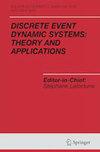犹太复国主义思辨:殖民视野及其崇高转向
IF 1.6
4区 计算机科学
Q4 AUTOMATION & CONTROL SYSTEMS
Discrete Event Dynamic Systems-Theory and Applications
Pub Date : 2023-01-01
DOI:10.1353/tae.2023.0007
引用次数: 1
摘要
摘要:本文认为投机是一种殖民方法。为此,它质疑视觉的意识形态角色,在早期犹太复国主义写作中,视觉被理解为对未来的计划和一种观察模式。通过对西奥多·赫茨尔(Theodor Herzl)的《旧新大陆》(Altneuland, Old-New Land, 1902)的分析,这是一部由犹太复国主义的“梦想家”出版的投机小说,视觉作为一种政治和视觉投机的实践而出现,它忽略了巴勒斯坦已经存在的东西,以便超越土地,看到其隐藏的未来潜力。通过突出有意的规划和预期的经济改善,这种投机成为殖民的理由和对土著存在的反诉,被种族化为效率低下和无意的。殖民投机进一步将这种监督实践与克服精神结合起来。通过将有意的选择集中在巴勒斯坦并改善它,殖民者不仅克服了他们最初的妥协立场-他们与土地的距离-而且还将其转化为他们最大的政治资产,因为距离成为投机,有意的愿景和所有权要求的先决条件。在这个崇高的转折中,殖民者随后的存在被呈现为优于土著居民的“单纯存在”。虽然犹太复国主义认为自己是一个彻底的物质工程,但它因此被暴露为一种投机小说的模式,它需要与土地保持距离,以基于前景而不是实际的改善来证明殖民的合理性。本文章由计算机程序翻译,如有差异,请以英文原文为准。
Zionist Speculation: Colonial Vision and Its Sublime Turn
Abstract:This essay considers speculation as a colonial method. To this end, it interrogates the ideological role of vision, understood as both a plan for the future and a mode of seeing, in early Zionist writing. Through an analysis of Theodor Herzl’s Altneuland (Old-New Land, 1902), a work of speculative fiction published by “the visionary” of Zionism, vision emerges as a practice of political and visual speculation that overlooks what already exists in Palestine in order to see beyond the land and into its hidden future potentials. By foregrounding intentional planning and prospective economic improvements, such speculation serves as a justification for colonization and as a counterclaim to indigenous presence, racialized as inefficient and unintentional. Colonial speculation further combines this practice of overseeing with an ethos overcoming. By centering the intentional choice to be present in Palestine and improve it, colonizers not only overcome their initial compromising position—their distance from the land—but also alchemically transfigure it into their greatest political asset, as distance becomes the precondition for speculative, intentional vision and its ownership claims. In this sublime turn, the colonizers’ subsequent presence is presented as superior to the “mere presence” of the indigenous population. While Zionism perceives itself as a thoroughly material project, it is thus exposed as a mode of speculative fiction, which requires distance from the land to justify colonization based on prospective rather than real improvements.
求助全文
通过发布文献求助,成功后即可免费获取论文全文。
去求助
来源期刊
CiteScore
3.90
自引率
5.00%
发文量
13
审稿时长
>12 weeks
期刊介绍:
The research on discrete event dynamic systems (DEDSs) is multi-disciplinary in nature and its development has been dynamic. Examples of DEDSs include manufacturing plants, communication networks, computer systems, management information databases, logistics systems, command-control-communication systems, robotics, and other man-made operational systems. The state processes of such systems cannot be described by differential equations in general. The aim of this journal, Discrete Event Dynamic Systems: Theory and Applications, is to publish high-quality, peer-reviewed papers on the modeling and control of, and all other aspects related to, DEDSs. In particular, the journal publishes papers dealing with general theories and methodologies of DEDSs and their applications to any particular subject, including hybrid systems, as well as papers discussing practical problems from which some generally applicable DEDS theories or methodologies can be formulated; The scope of this journal is defined by its emphasis on discrete events and the dynamic nature of the systems and on their modeling, control and optimization.

 求助内容:
求助内容: 应助结果提醒方式:
应助结果提醒方式:


